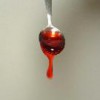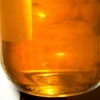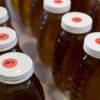 Honey has been used for medicinal purposes for thousands of years. It is rich in sugars such as glucose and fructose, but it also contains small amounts of vitamins, minerals, amino acids, and antioxidants such as phenolic acids and flavonoids. These nutrients help to make honey a unique, natural health product. Its market niche as a health product is growing, and current research supports the potential of honey as a medicinal product. This 3-page fact sheet describes health aspects of honey deriving from the floral source and color, beneficial compounds, anti-microbial properties and anti-inflammatory properties. Written by Sara Marshall, Liwei Gu, and Keith R. Schneider, and published by the UF Department of Food Science and Human Nutrition, April 2015.
Honey has been used for medicinal purposes for thousands of years. It is rich in sugars such as glucose and fructose, but it also contains small amounts of vitamins, minerals, amino acids, and antioxidants such as phenolic acids and flavonoids. These nutrients help to make honey a unique, natural health product. Its market niche as a health product is growing, and current research supports the potential of honey as a medicinal product. This 3-page fact sheet describes health aspects of honey deriving from the floral source and color, beneficial compounds, anti-microbial properties and anti-inflammatory properties. Written by Sara Marshall, Liwei Gu, and Keith R. Schneider, and published by the UF Department of Food Science and Human Nutrition, April 2015.
http://edis.ifas.ufl.edu/fs267
Tag: Honey
Infant Botulism and Honey (ENY128/AA142)
 Since honey is a potential and avoidable source of Clostridium botulinum spores, the Center for Disease Control and Prevention, the American Academy of Pediatricsm and the National Honey Board recommend that honey not be given to infants younger than 12 months of age. Honey should not be added to water, food, or formula fed to infants under 12 months of age. This 2-page fact sheet was written by Malcolm T. Sanford, Eddie Atkinson, Jeanette Klopchin, and Jamie Ellis, and published by the UF Department of Entomology and Nematology, June 2013.
Since honey is a potential and avoidable source of Clostridium botulinum spores, the Center for Disease Control and Prevention, the American Academy of Pediatricsm and the National Honey Board recommend that honey not be given to infants younger than 12 months of age. Honey should not be added to water, food, or formula fed to infants under 12 months of age. This 2-page fact sheet was written by Malcolm T. Sanford, Eddie Atkinson, Jeanette Klopchin, and Jamie Ellis, and published by the UF Department of Entomology and Nematology, June 2013.
http://edis.ifas.ufl.edu/aa142
Bottling, Labeling and Selling Honey in Florida (ENY159/IN918)
 In 2011, the Florida Legislature enacted HB 7209 allowing individuals to manufacture, sell, and store certain types of “cottage foods”(including honey) in an unlicensed kitchen. “Cottage food operations,” as they are called, require no licensing or permitting from the Florida Department of Agriculture and Consumer Services and are not inspected by any other state government entity. This 4-page fact sheet was written by Nancy Gentry and James D. Ellis, and published by the UF Department of Entomology and Nematology, August 2012.
In 2011, the Florida Legislature enacted HB 7209 allowing individuals to manufacture, sell, and store certain types of “cottage foods”(including honey) in an unlicensed kitchen. “Cottage food operations,” as they are called, require no licensing or permitting from the Florida Department of Agriculture and Consumer Services and are not inspected by any other state government entity. This 4-page fact sheet was written by Nancy Gentry and James D. Ellis, and published by the UF Department of Entomology and Nematology, August 2012.
http://edis.ifas.ufl.edu/in918
ENY128/AA142 Infant Botulism and Honey
Revised! ENY128, a 2-page fact sheet by Malcolm T. Sanford, Eddie Atkinson and Jamie Ellis, prepares beekeepers to answer questions responsibly about honey as a potential source of C. botulinum spores, which can cause botulism in infants under 12 months of age. Includes references. Published by the UF Department of Entomology and Nematology, October 2009.
http://edis.ifas.ufl.edu/AA142